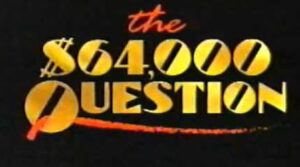The $64,000 Word Theory
Many people choose longer, more complex words because they think it makes them look smarter. They don’t realize the result takes longer to read, can send people (unhappily) to the dictionary, and gives the message that the writer is more important than the reader.
Experience has taught me there’s only one legitimate place for $64,000 words: academia. These people love big words — and often the longer and the more obscure, the better. If you’re trying to showcase your intelligence with this group — or speak in the way these people prefer — then these words are one accepted way to do both. (OK academics: feel free to take your potshots at me on this one — but I’m betting you’ll do it polysyllabically!)
For most people in a business setting, the $64,000 word is, at best, an annoyance. If they don’t know what it means, their first reaction is usually to feel stupid — and chances are, that’s not what you intended. Their next reaction is anger — at you. Are you trying to make fun of them? Are you being a show-off? Do you even know what the word means?
By this time, they’ve gotten so far from the ideas you’re trying to share that they may never return, which means you’ll never reach your objective. Everybody loses: especially you, if you wanted them to approve something.
To avoid this situation, turn to these tricks:
Trick #1: Know your audience.
If you’re communicating with another wordie, go ahead and use challenging language. This person will appreciate it. (Honestly: I just wrote a memo with “purview” in it because I knew the CEO would like it!) If not, forget it. Most people read for content and not for style, and if you’re choosing words that scream “pay attention to me,” then they’re shouting over your content.
Trick #2: Watch for jargon.
This falls into the same category as $64,000 words for me. Those who don’t know them feel excluded, stupid and angry. When jargon is appropriate, define your term the first time it appears. Those who know it will congratulate themselves, and you’ll avoid negativity from everyone else.
Trick #3: Kill the Latinate words.
These are the long ones that sound like legal terms, and have their origins in Latin. For my money, there’s a reason they call it a “dead language.” This includes terms such as “therefore” (try “so”), “pursuant” (try “after”), “heretofore” (try “until now”), and “notwithstanding” (try “although”). When given the option of a complex versus a simple word, go for the latter. Don’t let your words get in the way of your meaning.
Trick #4: Use the thesaurus sparingly.
Most people pick one up because they’re using the same word a lot and want to give their readers some variety. This is a noble gesture. But a thesaurus can also be a crutch. Instead of trying to find new ways to express yourself, you just want to change one word. Often you end up going several words deep among the synonyms to find one that will work — and the further you, the more obscure the term becomes. Remember: it’s not just word choice — it’s about thoughtful writing.
You want to keep your readers focused on the text — not the subtext (I’m smart, you’re dumb, etc.). The next time you have a choice, select the shorter rather than the longer word. You’ll find it usually takes you a much greater distance toward your communication’s goal than the bigger ones.

